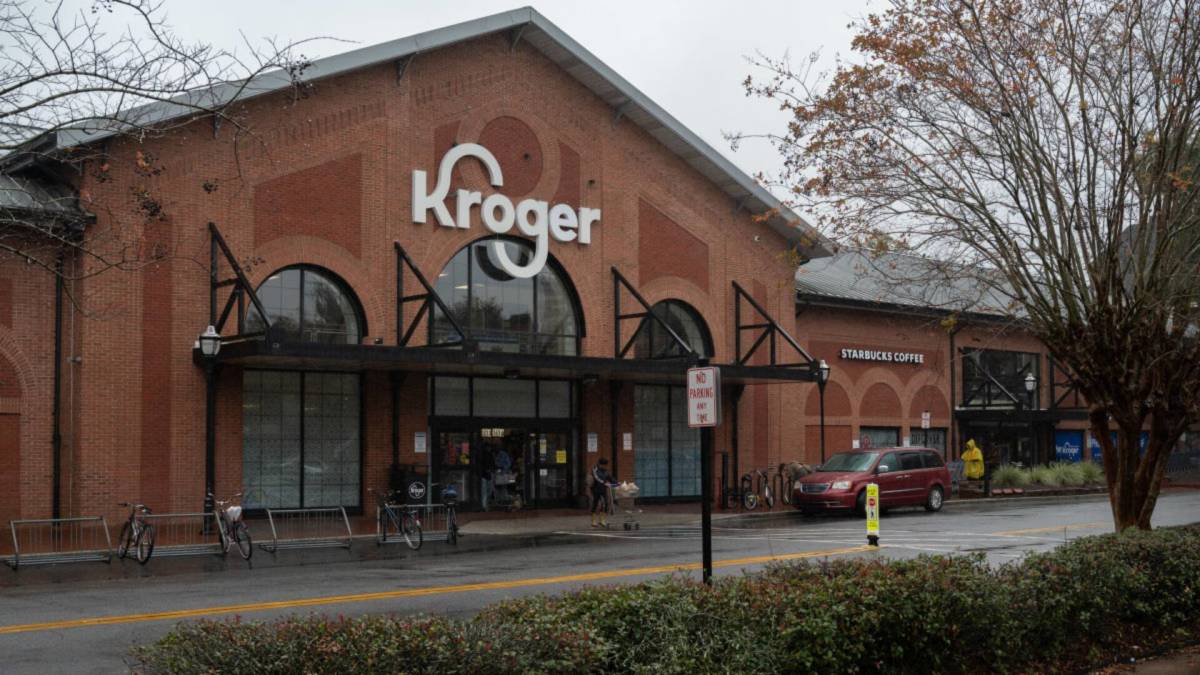The Food and Drug Administration (FDA) issues food recalls frequently — on average, at least once a week.
Some are voluntary, such as when companies discover a labeling mistake or possible contamination. Others are mandatory when federal regulators determine a product could cause severe illness or death.
That is the case with the latest recall tied to Kroger (KR) .
The grocery chain has pulled Home Chef-branded ready-to-eat meals from stores after federal health officials linked them to a listeria outbreak. The products, manufactured by FreshRealm, are part of a larger recall that has also affected foods sold at Walmart and Trader Joe’s.
So far, the outbreak has been linked to 19 hospitalizations and four deaths across 15 states, according to federal data.

Image source: Bloomberg/Getty Images
Kroger recall details
The following product is included in the recall, which was initially published in June 2025:
- Product name: Kroger Home Chef Chicken Fettuccine Alfredo Meal
- “Best if used by” dates: September 20, 24, and 27, 2025
- Lot numbers/UPC codes: 8-40134-30814
Consumers should throw away the affected meals immediately. They can also return them to the store for a full refund.
The product was sold at Kroger, Baker’s, Gerbes, King Soopers, City Market, Fry’s, Fred Meyer, Ralphs, Dillon’s QFC, and Smith’s stores in:
- Alabama: Huntsville and Auburn
- Arkansas
- Indiana (except SE Indiana, Evansville)
- Illinois
- Kentucky
- Louisiana
- Michigan
- Missouri
- Mississippi
- North Carolina
- Ohio
- South Carolina
- Tennessee
- Texas
- Virginia
- West Virginia
Customers can also call the manufacturer FreshRealm at 888-244-1562 for more information.
The United States Department of Agriculture (USDA) announcement also includes a Trader Joe’s product from the same manufacturer — Cajun Style Blackened Chicken Breast Fettuccini Alfredo. The Walmart (WMT) product is the Marketside Linguine with Beef Meatballs and Marinara Sauce.
CDC and USDA issue consumer warnings on Kroger, Trader Joe’s, Walmart products
The Centers for Disease Control and Prevention (CDC) has warned that while the recalled products are no longer being sold, they may still be in consumers’ refrigerators or freezers.
The CDC recommends that anyone who purchased the meals should:
- Discard or return the products
- Clean refrigerators, containers, and kitchen surfaces that may have touched the recalled food
- Watch for symptoms of listeriosis, especially in high-risk groups
Related: Trader Joe’s issues urgent recall for contaminated food
The USDA further cautioned that listeria can survive on surfaces and spread easily. It can hide in cracks and corners even after cleaning. The agency recommends disinfecting potentially contaminated areas with bleach or hydrogen peroxide.
“The danger lies in the fact that a surface may appear clean, yet resistant bacteria can still be hiding in cracks and corners,” Senior Researcher at the DTU National Food Institute, Pimlapas Shinny Leekitcharoenphon, said in a recent report.
Foods most often affected by listeria
Because Listeria thrives in cold environments, it can contaminate refrigerated and ready-to-eat foods. Federal agencies warn consumers to be especially cautious with:
- Deli meats and hot dogs that haven’t been reheated to 165°F
- Refrigerated smoked seafood that isn’t canned, shelf-stable, or fully cooked
- Sprouts that are not thoroughly cooked
- Soft cheeses made from unpasteurized milk
- Raw (unpasteurized) milk
Why food recalls happen so often
Food recalls are not uncommon in the U.S. In 2024 alone, the FDA oversaw 422 food recalls, costing companies an estimated $1.92 billion in direct expenses, according to an analysis by New Food.
On average, each recall costs a company about $10 million. Food recalls happen for a range of reasons:
- 45.5% due to labeling errors
- 14.7% linked to listeria
- 10% involving salmonella
- 8.8% related to foreign objects, such as shards of glass
- 2.6% due to E. coli
What consumers should do
The Kroger recall underscores how a single manufacturer’s supply chain can impact multiple major retailers and thousands of households.
Federal officials stress that consumers should not take chances with recalled food — even if it looks or smells safe. Listeria contamination is invisible and can cause life-threatening illness, particularly for pregnant women, newborns, older adults, and people with weakened immune systems.
Anyone who believes they may have eaten the affected product and experiences fever, muscle aches, or gastrointestinal symptoms is advised to contact a health care provider immediately.
How to stay updated on food recalls
Shoppers can stay informed about the latest recalls by checking the FDA’s official food recall database here and the CDC’s food safety alerts page here.
You can also sign up for email alerts from both agencies to ensure quick notification when new recalls are issued.
Related: Costco issues urgent recall on major Kirkland product
#Kroger #expands #food #recall #CDC #USDA #warn #listeria #risks